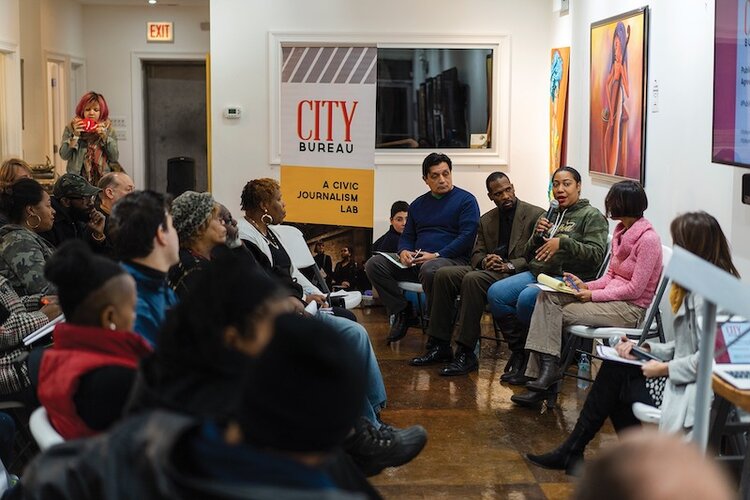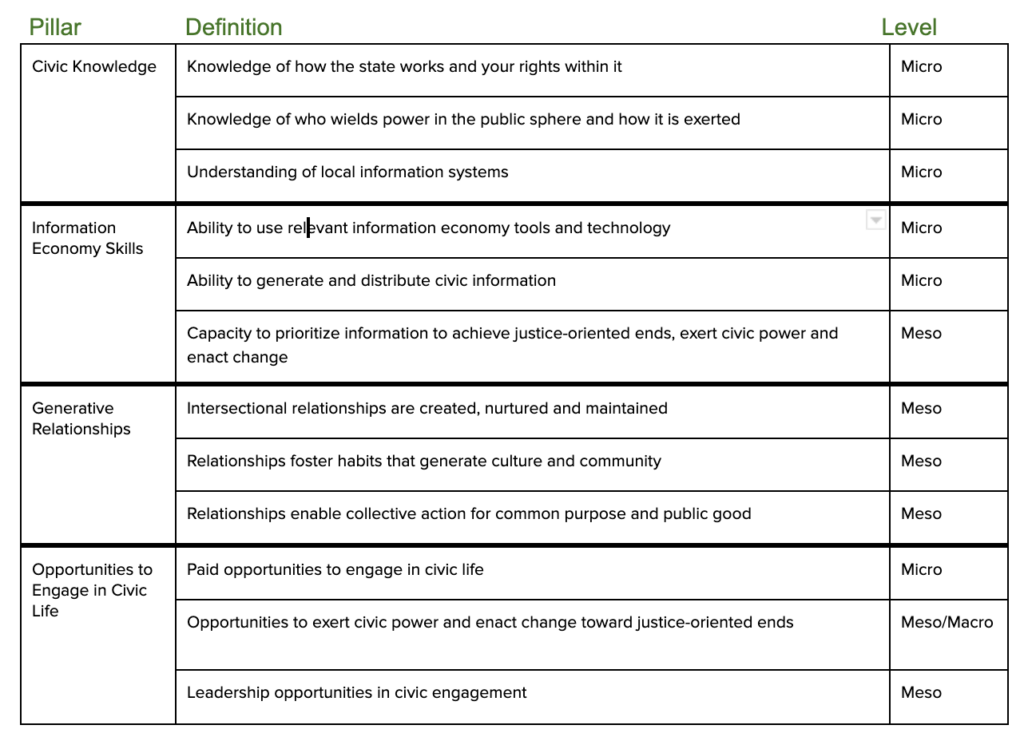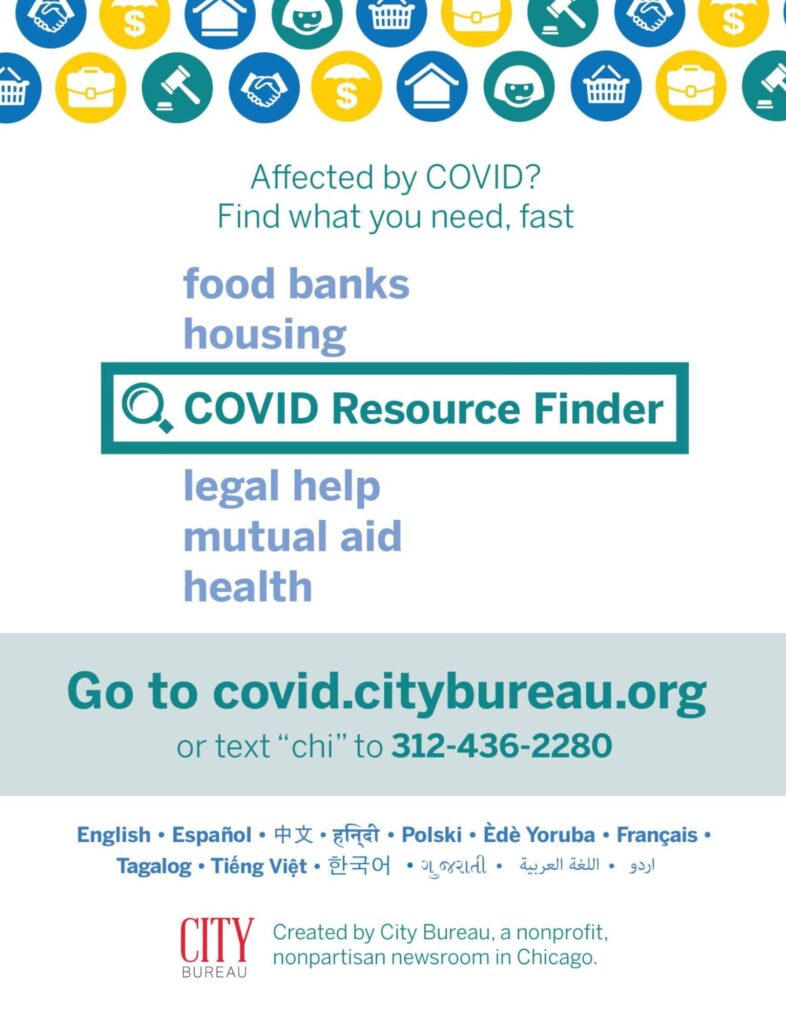
By Darryl Holliday, City Bureau
May 26, 2022
Who We Are
Founded in 2015, City Bureau equips people with civic media skills, engages them in critical public conversations and produces information that directly addresses people’s information needs. Over seven years we’ve built three programs that engage Chicagoans directly in the process of producing civic media, which we define as news and information that supports civic engagement. Through our work we have helped to reimagine how local media can operate—and for whom—not only in Chicago, but in other communities across the U.S.

We currently have a staff of 17 and a budget of $2 million across our organization.
As we learned and grew, our focus shifted from filling gaps within the existing local media ecosystem—including poor coverage of communities of color and a lack of diverse voices in newsrooms—to attempting to cultivate a new, more equitable and democratic system that could replace it entirely. Our experience shows that to live up to its ideals, journalism needs many more people involved—not just as consumers, but as producers and distributors working in collaboration with professional newsrooms. To that end, our work training civic reporters and Documenters (more on them below) is aligned and allied with public education, community organizing, public access media and local libraries.
Redefining Impact
Imagine if the success of a newsroom were measured by the quality of civic action informed and inspired by its reporting. What fundamental assumptions might we need to challenge when it comes to how local news is made and produced—and how journalism is defined?
Before we could measure impact at City Bureau, we needed to acknowledge the history and limitations of how the media industry has framed impact in the past—and come up with new questions to guide our learning. Do media outlets see themselves and their reporters as change agents? Do they see themselves as part of an ecosystem rooted in the public interest? What would a theory of change for journalism as a public good look like in practice—and how would it manifest in peoples’ lives?
Over an 11-month period in 2019, our staff, board and members of our community engaged in deep conversations, interactive activities, working sessions and group reflection in an effort to align, and re-commit to, our values. These conversations were the building blocks for our current strategic plan.
The first part of our impact experiment was detailed in our February 2020 report titled “Metrics to Match Our Mission: Measuring City Bureau’s Impact.” It begins with the story of Chicago’s Pullman Porters—Black Chicagoans hired to serve railway passengers from 1860-1960—and how they embodied a novel kind of participatory journalism that we’re inspired by at City Bureau all these years later. The Pullman Porters, we wrote, “served as news gatherer, distributor, journalist, storyteller and ‘invisible grassroots organizer’ while traveling the country, creating and carrying news and information from place to place, news outlet to news outlet and person to person.”
The report ends by describing our impact pillars, the four areas where we hope to have the most impact in the lives of our readers and program participants: civic knowledge, information economy skills, generative relationships and opportunities to engage in civic life.

One project that touched on all four of our impact pillars was created during the pandemic when we launched the COVID Resource Finder. We built the Resource Finder after surveying dozens of community groups, service organizations and public officials. Our local partners told us that information on COVID-19 was readily available but the deluge of information made finding the right information difficult. From food banks and emergency cash to mutual aid for South Side seniors, our COVID Resource Finder was a database of more than 1,300 COVID-related resources in Chicago—available in 10 languages thanks to local translators. Resources could be sorted by who is eligible (immigrants, families, business owners), what is offered (food, money, legal help), languages spoken and location.

At the end of the day, the COVID Resource Finder was intended to meet the urgency of the moment, i.e., helping vulnerable Chicagoans through the pandemic by connecting available resources to need. By engaging City Bureau reporting fellows as researchers and fact-checkers and engaging members of our community in the process of curating useful information, we developed new connections and understanding within our local ecosystem, made it easier for Chicagoans to prioritize information that led to justice-oriented ends, supported relationships that enabled collective action, and operated paid opportunities for others to engage in a civic process.
Beyond traditional impact tracking
At City Bureau, we believe that an information system with many informed citizens who are networked with each other is more resilient than one that depends on a few powerful individuals and institutions. City Bureau’s programs are designed to decentralize the power of media institutions and redistribute that power among people who are connected to each other at the grassroots level. This requires people to be not just informed and engaged but equipped to play a role in civic processes. Knowledge must be shared among more people, but relationships, skills and opportunities are an equally important part of the equation.
Because impact happens across teams and departments, we developed an impact tracking system where anyone can log in impact data and anecdotal reports using a common, standardized format. Our organizational impact tracking system is built on qualitative and quantitative data using Airtable, a user-friendly, versatile tool for building collaborative work.
By tracking impact across programs, we’ve become better positioned to see how people who connect with multiple City Bureau programs become highly engaged citizens who know where and how to leverage power in their communities, and who can share that power with their peers.
Here are three of our key programs and their impact based on several measures (and note, the numbers below primarily reflect impact as of the end of 2021):
Journalists play a key leadership role in a local information system. By ensuring these positions are filled by people who identify as Black, Indigenous and people of color (BIPOC) or other marginalized identities, and that they are equipped with engaged journalism and leadership skills, we ensure that the information system is more resilient and equitable.
Since we launch the Civic Reporting Fellowship in 2015, the program has:
We know there is a widespread desire in some communities to participate in repairing local information systems, especially among those most harmed by the status quo. We developed Chicago Documenters, which consists of paying and training hundreds of people to attend under-reported public meetings, write up what happens, and publish what they find. Documenters thus create new pathways for people to learn about and monitor civic processes by observing and reporting on local government.
Since we launched Chicago Documenters in 2016, the program has:
Intentional partnerships with community groups is another key way to strengthen the information system. We do this through our Public Newsroom.
Since launching the Public Newsroom in 2016, the program has:
What’s Next?
We believe that by growing City Bureau programs in Chicago, and by ensuring equitable participation among those disenfranchised in the existing information system, we can have a long-lasting impact in and beyond Chicago.
We also believe that redefining journalistic impact is urgent in this era of crisis in local news. A new civic media movement is possible but, like any movement, it will depend on coordinated action between adjacent sectors within an information ecosystem. These include newsrooms, community organizations, educational institutions and other institutions working together with engaged residents to improve civic health, beginning at a local level. A common language, including shared definitions of what constitutes impact, could break new ground for civic media.
See more case studies on the impact of nonprofit news.
Back to top